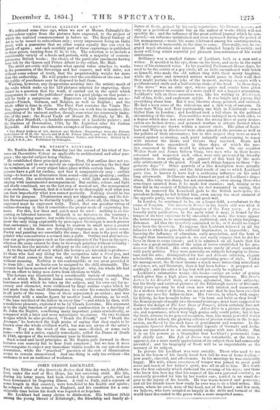1.1R. RUSKIN'S LECTURES.
Mr. Ruskin delivered on Saturday last the second of his triad of lec- tures on Decorative Colour as applicable to architectural and other pur- poses ; the special subject being Outline. He established three principal points. First, that outline does not ex- ist in nature, and in art is merely an expedient for asserting the fact that the termination of every object takes place within certain limits. Many persons have a gift for outline, and find it comparatively easy : outline being—to borrow an illustration tient sound—like plain speaking ; outline with colour, like articulation with singing ; with light and shade, like singing with instrumental accompaniment. But outline, colour, and light and shade combined, are as the last step of musical tut, the management of an orchestra. Second, that it is better to do thoroughly well what you can than imperfectly what you cannot perfectly. Nothing should be too fine for its purpose. Illumination must not impede reading, and the let- ters themselves must be distinctly legible ; and, above all, the thing to be expressed must be expressed truly. Third, that one peculiar virtue of outline-drawing is that it constitutes the proper mode of expressing hu- mour. For this, few lines and quick must be used : nothing is so dis- gusting as laboured humour. Hogarth is no instance to the contrary ; his is no laughing matter, but noble things, agonizing satire. Nor is hu- mour the only thing expressible by grotesques. Grotesque is much greater than caricature ; its function being to express in small space a greater number of truths than are thoroughly congruous in an artistic sense. Poetry and painting are essentially the same ; that man is the poet or the painter who concentratee a sermon into a sight. Outline and abstract co- lour can give grotesques such as the embodiments of the Vices in Spenser ; whereas the same cannot be done in thorough painting without triviality : and herein lies the mistake of allegory as the subject of a picture. As to the method of study which the lectures are intended to produce— let those who feel any liking for the occupation take a blunt pen, and draw all that comes in their way, only let there never be a line done without meaning. Nothing is too contemptible or too great provided it be from life ; and no limits can be assigned to the skill attainable. The lecturer had been accused of not being practical : why, his whole life had been an effort to bring men down from idealism to truth.
The lecture was illustrated by a considerable variety of examples, on each of which Mr. Ruskin found something enlivening to say. The heartiness with which he takes up the subject, and his own eye for ac- curacy and character, were evidenced by large outline copies which he had made from the small illuminations, to render his remarks intelligible in all parts of the room. One of these represented an archer ; and was contrasted with a similar figure by another hand, showing, as he said, "the base intellect of the fellow in every line "—and which be then, with a malicious pleasure, explained to be by Claude Lorraine. His argument as to the right function of grotesque found confirmation in a drawing of St. John the Baptist, combining many important points symbolically, as compared with a later and more naturalistic treatment. On two German designs which he also produced, "Death the Friend," and "Death the Avenger," he bestowed the high praise of saying that they ought to be known over the whole civilized world, but was not aware of the artist's name. Tl ey are the work of the same man—Bethel, or some such name—who did a series, equally remarkable, called the Dance of Death in 1848, apropos of the revolutionary year in Germany. Such sound and lucid principles as Mr. Ruskin puts forward in these lectures can scarcely fail to bear fruit somehow ; but we fear it were over-sanguine to expect any immediate visible results in our out-of-doors decoration, while the "practical" question of the cost of illumination seems to remain unanswered. And one thing is only too evident—the audience is not an audience of workmen.


































 Previous page
Previous page